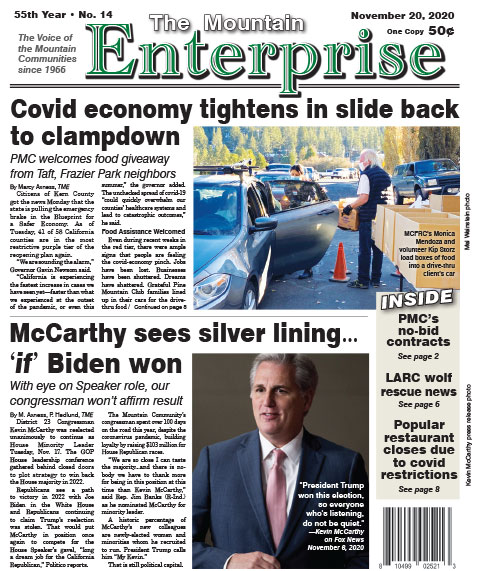Asking Questions Does Not Mean Someone Has Done Wrong; It Means That Sharing Facts Creates Trust
By Patric Hedlund, TME
I want to be clear with readers about what I am NOT saying in the editorial, “Naughty Language and the Chairman of the Board” on October 30. It was a follow-up to our news report, “Auditor Warns PMC of Conflict of Interest Concerns,” published in the October 23 issue of The Mountain Enterprise. Pine Mountain Club Chairman Bill Lewis II sent an email titled “Message from The Chairman of the Board” to all households in PMC whose email addresses had been collected by the POA for an emergency alert and community bulletins system. Now, we note, it has become a one-way political megaphone for Mr. Lewis II. TME had invited Mr. Lewis to join in a dialogue, but he chose to ignore that. Instead, he spun a jaw-dropping torrent of words into what one member called “a classic non-denial denial.”
The Mountain Enterprise report October 23 was straightforward and fact-based, telling what was visible to every member in the audits they received in their own post-office boxes. We did not report that the PMCPOA contracts with American Business Machines (ABM) through the PMCPOA General Manager’s husband are a bad choice.
The leases are expensive, but we have not yet seen the underlying details to show why spending these $200,000 to $300,000 over five or six years was or was not the best choice. Years ago I entered into such a lease for a company I owned. It was a burden, because a five-year lease that cannot be canceled kept us from adopting new technology that was more affordable and more efficient.
The PMCPOA manager said she is concerned about maintenance issues. This is a responsible concern. Still, a piece of equipment of a certain price should come with a strong warranty and service guarantees.
Requests for Proposals (RFPs)
Making purchasing decisions can be difficult. PMCPOA says it has a hard time securing competitive bids. One of the first questions should be: How competent was the request for proposals (RFP) issued to vendors? Often the quality and quantity of bids you receive are a direct reflection of the quality of the RFP sent out.
Quality RFPs = Quality Bids
Bad RFPs often result in bad bids and inadequate responses. Inexperience in researching and composing RFPs opens the door for manipulation of the bidding process. There are many ways to manipulate the drafting of an RFP. A buyer may contact a vendor seeking expert input about what kinds of products can meet the buyer’s needs. The vendor may offer to help a manager with technical details, then craft an RFP that only that vendor’s own company can meet. This can make the choice of vendor a foregone conclusion. When other vendors know or suspect this is occurring, they will often not bother to bid at all.
Directors, managers and board chairs who do not study the situation closely can be easily fooled.
Transparency Grows Trust
We all want to live with trust in our neighbors, our families, our fellow human beings. But the very reason boards of directors exist is because vigilance is essential when handling other people’s money. Public trust must be placed in the people we elect, but in turn, those elected have to take that trust with the greatest seriousness and diligence. If not, the system breaks down. The public is left unprotected.
That is why members of boards need to sincerely welcome questions from members, citizens and journalists. That is their job. Ultimately, transparency makes life easier for everybody.
Red Flags
It is a red flag if those who have to ask for facts are greeted with cat-and-mouse hiding of data, refusal to answer questions or a tirade of indignation because members or journalists have the audacity to ask questions. An overly defensive response sends the message that either something is being hidden, or the person in a leadership position may tend to be a bit too thin-skinned to fulfill their responsibility as a leader.
Questions Add Value
In Pine Mountain Club, a persistent effort to create a culture of exclusion has developed to ridicule or marginalize those who ask questions. This is a common phenomenon in HOAs, POAs, even PTAs. The chairman hogging the email blast for one-way spin without rebuttal, or refusing to show requested documents to members for months, blaming covid, and removing newspaper racks from the clubhouse to try to stifle dialogue are danger signals.
The pandemic recession has left many members uncomfortable about assessment rates and expenses. Family budgets are pinched by unemployment, rising insurance costs, property taxes, inflation, medical bills and meager retirement incomes.
Members have every right to ask responsible questions. The POA has a responsibility to answer them promptly and respectfully.
Trying to silence those who seek more transparency, or to isolate those on their own board by refusing to offer a “second” to a resolution with which the chairman disagrees to allow discussion (as occurred repeatedly to former Director Bryan Skelly) is poor statesmanship. These are troubling signs, and they have all been visible in PMCPOA.
Dialogue Heals Distrust
Petty behaviors may be human nature in junior high school, but they are not healthy practices for a POA that has the ability to levy $1500 fines against its members with no warning; to enter into nonjudicial foreclosures of people’s property; to take an entire debt-free community into over a million dollars of debt without consultation with the members who will be stuck paying the bill for decades; or to increase assessments on people’s properties.
No board or board chairman has a right to get grouchy when asked to provide rigorous justification for raising assessments rather than tightening belts.
So much influence over so many people’s lives needs to be balanced by a board and management devoted to full disclosure and respect for open dialogue.
Directors and managers must be held to a higher standard, and they need to be eager to rise to that higher standard.
Respect
Serving the public is not for sissies. Questions about means and methods of purchasing and budgeting are not personal. They are part of the territory. Those with thin skin or fragile egos should apply elsewhere.
Those who wish to lead and those who want the paychecks and benefits associated with managing are owed respect when they do their jobs well. Their job, in return, is to respect the people they serve. All the people they serve. Even those who ask questions.
_______________________________________________________________________
This Editorial was first published November 13, 2020 in The Mountain Enterprise
This is part of the November 20, 2020 online edition of The Mountain Enterprise.
Have an opinion on this matter? We'd like to hear from you.


